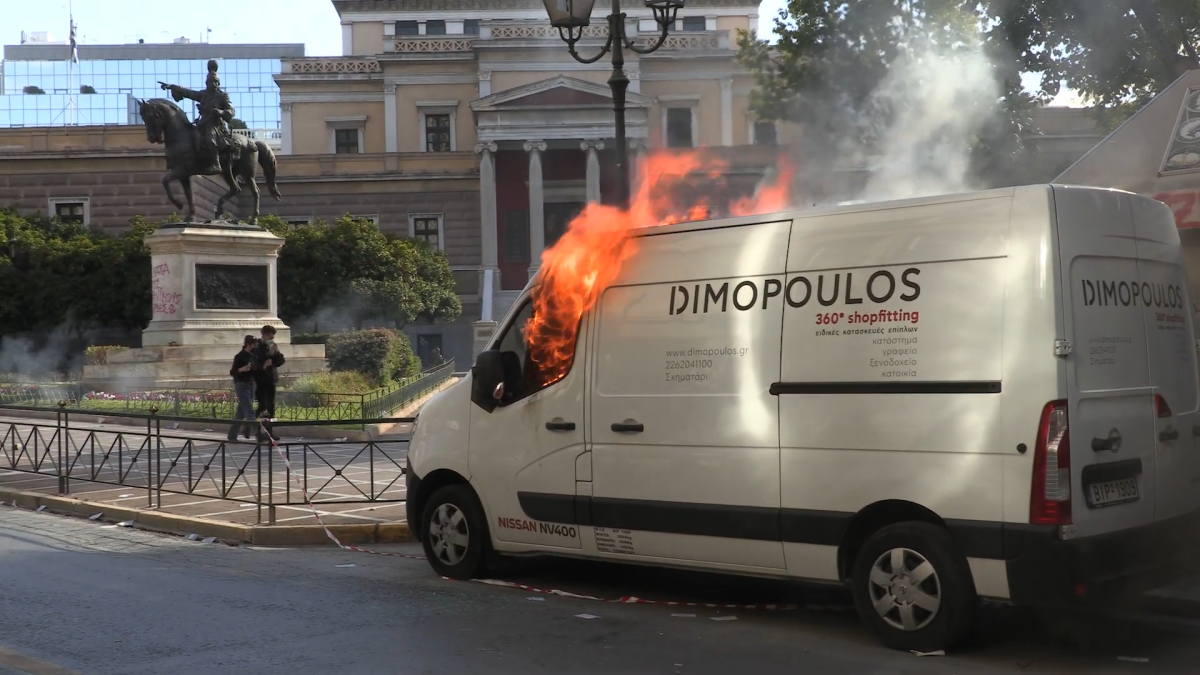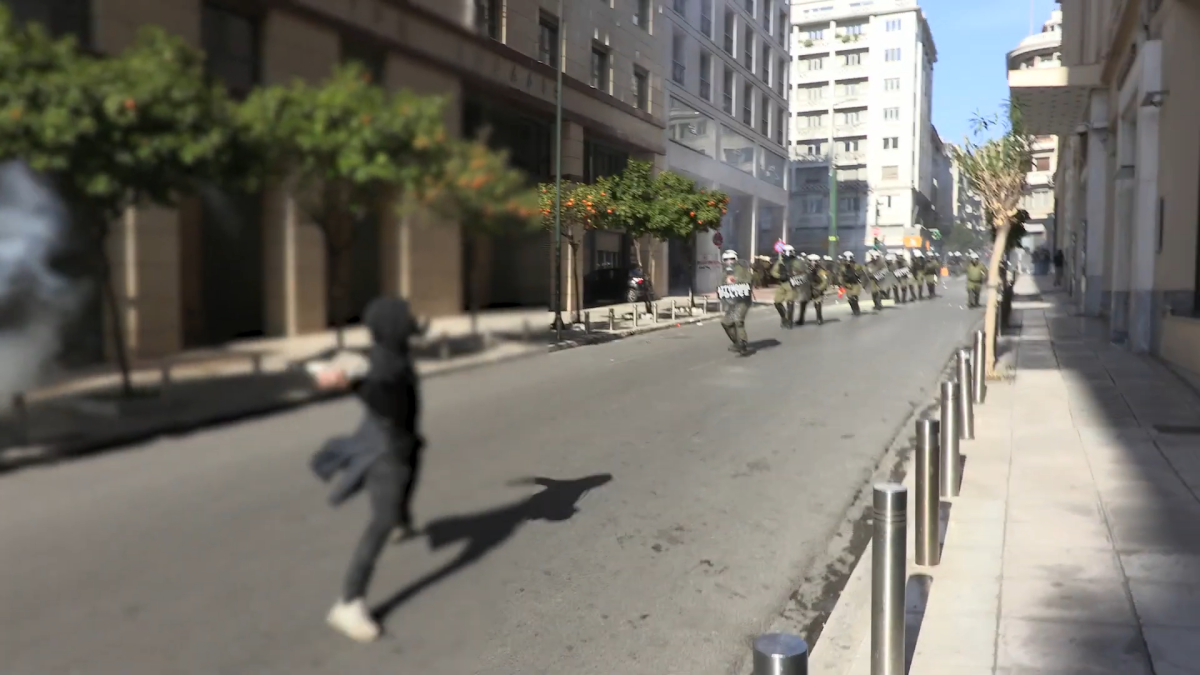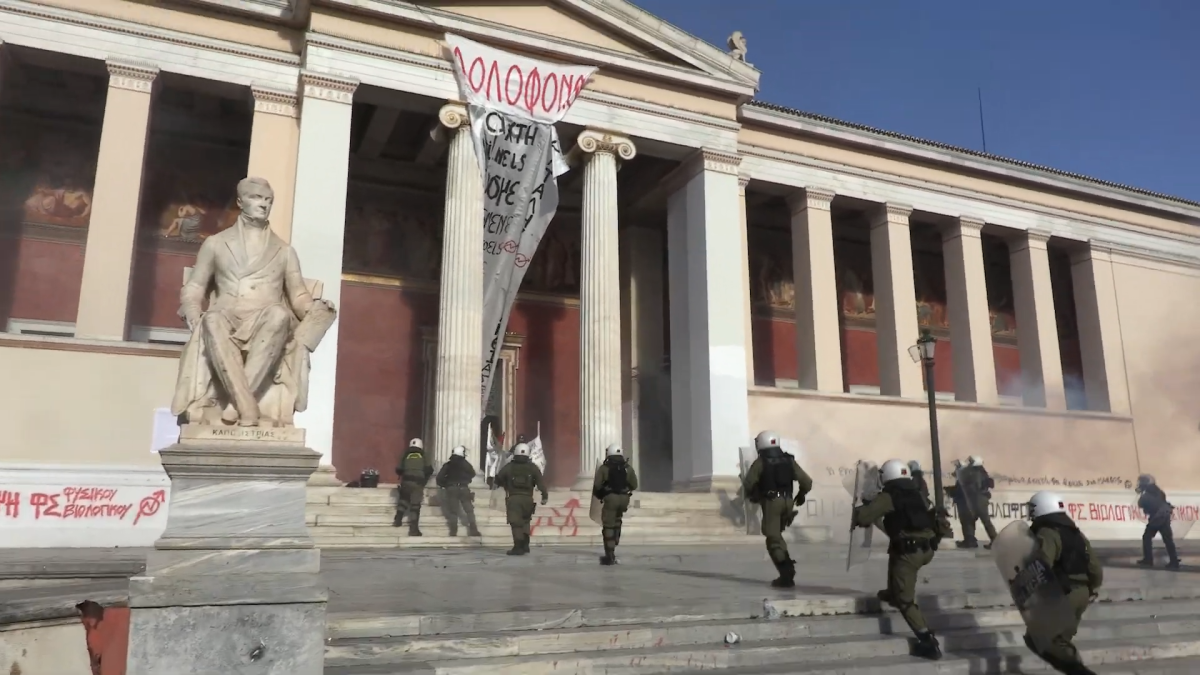Public anger has erupted over a lack of political accountability in the wake of the tragic train crash near the city of Larissa in Greece.
On Wednesday, March 8, after a general strike had been proclaimed for that day, a massive crowd gathered in the centre of Athens. Avenues connecting Syntagma Square, right outside the Parliament, all the way to Omonoia Square (the second central square of Athens) were packed with people.
It was unquestionably the largest demonstration in over a decade, with an estimated crowd of up to one hundred thousand. Public anger had reached a tipping point, and it took only a spark for an extended, severe riot to break out.
The protest was in response to the tragic train crash, which happened the previous Tuesday night, February 28. The exact number of casualties is yet to be determined. Fifty-seven have been pronounced dead so far, with many more injured. Wednesday’s demonstration wasn’t the first of its kind, but rather the culmination of protests all over Greece since the previous Wednesday, March 1.
At first glance at the news, a foreign reader might be puzzled by why a tragedy of this sort would be politicized to such an extent, but to the majority of the Greek public this wasn’t just a horrific misfortunate. It was, as the graffiti reads in Greece these days, “A Crime of the State”.
The events of February 28, definitely involve human error. A passenger train ended up in the same track as a cargo carrier coming from the opposite direction. For twelve whole minutes the two trains were speeding towards each other at 166km/h, eventually crashing in a nightmarish head on collision, at Tempi, just outside the city of Larissa.
Video Links
https://www.facebook.com/KouletsiouNikol/videos/2234748540038197
https://www.facebook.com/lazos.papazisis.5/videos/1359454877954621
The fifty-nine-year-old station master of Larissa has since been arrested and charged with multiple counts of manslaughter, and disruption to public transport security.
His lawyer made the following statement on Thursday, March 2, hinting clearly at the broad scope of responsibility for the disaster: “The accused is literally devastated (…) He has assumed the share of responsibility that is proportionate to him, within the frame of responsibility that he should have and he does, but beyond that, we should not focus on the tree when there is a whole forest behind it.”
On the same day, the rail workers held a strike, blaming all governments and especially the current one of Nea Dimokratia, for criminal neglect that led to the tragic events. Union representatives have been appearing on national television, exclaiming that they have warned about such dangers repeatedly, protesting against poor working conditions, chronic under-staffing and a failure to implement basic infrastructure upgrades.
However, whenever they have attempted to strike over this in the last few years, these were deemed illegal, based on new legislation introduced by Nea Dimokratia Minister Kostas Hatzidakis.

Public debate in Greece has also focused on the damage to the railroad system caused by privatization, which was always championed by the current right-wing government, but was in fact signed into law by the previous left-wing SYRIZA government.
The leader of MERA 25 (another left-wing party in Parliament) and former finance minister Yanis Varoufakis tweeted on Wednesday, March 1: “Now is the moment to grieve and to look after the injured and the victims’ families. But soon we shall bring to Greece’s parliament the underlying issue: yet another tragedy caused by a hideous railway privatization. Paddington 1999, Larissa 2023.”
Already on that same day, protests had started, with violent clashes erupting in Athens between riot police and protesters.
As a result of the negligence of the Greek state, the death of 36 people in the Train massacre last night was protested in Athens. Greek police repeatedly attacked the protesters with chemical gasses. #Τεμπη #Τεμπη_Τραγωδια #Λαρισα #τρενα #τραυματιες #Antireport #Greece pic.twitter.com/V5E62VIunC
— Partizan Yunanistan (@partizanGreece1) March 1, 2023
The Government followed a tactic of heavily policing every relevant gathering, even in situations where people were grieving peacefully. The sadly predictable Greek standard of police brutality ensued, further fueling the public’s anger.
More demonstrations were held on Thursday and Friday. There was a call out to more than twenty cities across Greece, with heavy clashes erupting again in Athens and Thessaloniki.
Athens now. There are clashes between the Police and the Activists. #Τεμπη #Τεμπη_Τραγωδια #Λαρισα #τρενα #τραυματιες #Antireport #Greece #athens pic.twitter.com/DyiAfKFWVX
— Partizan Yunanistan (@partizanGreece1) March 3, 2023
The situation kept escalating and on Sunday, March 5, a thirty-thousand-strong-crowd gathered in Syntagma Square and went on to march through the centre of Athens. Once again, violent riots broke out and spread throughout the city centre.
Another aspect of the tragedy, which has stoked public anger, has been the mainstream media coverage, which in many cases has been simply to parrot all the talking points of the Nea Dimokratia government about the crash.
The media situation in Greece is exceptionally dire under the current administration, which has consolidated an unprecedented amount of control over it, which is only broken by social media, as has been explained in a previous article.
Greek wiretapping scandal involving use of illegal Predator spyware is threatening to bring down the New Democracy government of Kyriakos Mitsotakis.https://t.co/Ilte1wEglo@atsipras @nasoskook @POLITICOEurope @globalfreemedia @Nikoletoug @reporters_gr @RSF_inter @SophieintVeld
— CassandraVoices (@VoicesCassandra) August 10, 2022
In the aftermath of the train crash we have seen one of the most blatant manifestations of such corrupt journalism. But in this case it seems the public is not buying it, to a greater extent than ever before.
A video from a popular YouTube channel, mocking several well-known TV journalists for their coverage of the disaster, has gone viral, trending #1 for several days as it received over six hundred thousand views in less than two days. A huge figure bearing in mind Greece’s population is ten million.
The communication strategy of the government and its client media in terms of damage limitation, has been primarily to scapegoat the Larissa station master and secondarily – when the first approach fails – to make the case that this is a chronic problem, and not the responsibility of the current government. But the information that has been coming to light is damning to this narrative.
According to multiple testimonies of people who are or had been working in the railway in various positions there was a significant drop in security precautions – which were already incomplete and defective – since Nea Dimokratia took office.
Staff numbers have been cut, resulting in there being just one station master working the shift instead of two. Also, there were monitoring systems in operation until the summer of 2019, when Nea Dimokratia came to power.
Finally, even the communication tactic of pushing all the blame onto the station master has backfired, as it was proven he was recently hired and put in his position despite lacking qualifications, in a typical Greek manner of “rousfeti”, which refers to politicians doing favors to win over influential constituents.
The Minister of Transportation, Achileas Karamanlis, a member of one of the three major political “clans” of Greece, was forced to resign. His resignation however, seems blatantly tokenistic, as he is still included in the Nea Dimokratia ballots to be reelected MP in the forthcoming election.
Reflecting particularly badly on him is a video of his speech before Parliament, which surfaced a few days after the tragic events. Just one week before the accident, Karamanlis is heard castigating members of the opposition for even implying that there could be a problem with safety in the railway system.

The Nea Dimokratia government has shifted its communication strategy and primary narrative a few times already, in an effort to adapt it to the public’s negative reception. But this in itself has undermined their credibility, creating an impression that they are solely focusing on a communication strategy, relying on shills within the mainstream media.
The situation is still unfolding as the street protests have not finished. There is another general strike proclaimed for Thursday, March 16 and that will be the point when it can be determined whether we are looking at a seismic popular revolt or a de-escalation.
Whatever the outcome, the Mitsotakis government has suffered a severe blow to their image at the worst possible moment. They are now likely to try and push out the date of the elections as far as May. This is the latest date permitted, but it’s unlikely to leave sufficient time for this affair to blow over.




